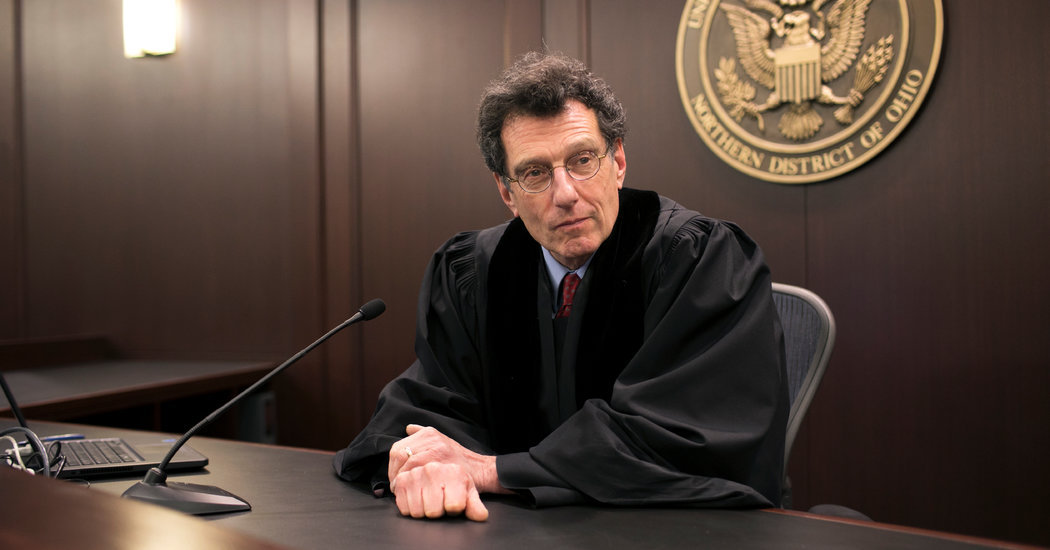
CLEVELAND — A mayor of a small West Virginia city brought to its knees by opioids and representatives of large cities and counties left reeling by the epidemic will gather in federal court here on Friday morning, to sit side by side with chief executives from the country’s largest drug distributors. Along with platoons of lawyers, including representatives from four state attorneys general, they have been summoned by Judge Dan A. Polster, who is trying to wrest a far-reaching, last-minute agreement to resolve thousands of lawsuits before the start of the first trial on Monday.
The distributors — AmerisourceBergen, Cardinal Health and McKesson — along with other companies are trying to strike a megadeal that would release them not only from the immediate trial, brought by two Ohio counties, but the rest of the cases. Most of the cases are being supervised by Judge Polster, but several hundred are percolating in just about every state court.
There are many more drug industry defendants, including the pharmacy chains Walmart, Rite Aid and CVS, in the far-flung web of litigation. But with the exception of Purdue Pharma, whose own tentative settlement is now being scrutinized in bankruptcy court, the six corporate defendants in this trial could be the first in the national opioid litigation to reach a so-called global settlement. Plaintiffs’ lawyers say they hope such a deal would have a domino effect on the remaining defendants, encouraging them to reach a comprehensive deal too.
Four people familiar with the settlement discussions characterized them as “fluid.” While parties had been talking about a deal worth nearly $50 billion, lawyers for thousands of small governments whose cases are before Judge Polster said they wanted more money, the timeline for payments to shorten and specific guarantees on how those funds would be distributed.
The six defendants expected to appear at Judge Polster’s request include the three giant drug distributors; a small distributor; Teva, which makes generic drugs; Walgreens, the pharmacy chain; and Johnson & Johnson, which has already settled the Ohio case but has said it was looking for a broader resolution.
Officials from New York City, Boston, Chicago, Nashville, Broward County, Fla., Delaware County, Pa. and Huntington, W. Va. are also expected to appear, as are lawyers for Tennessee, North Carolina, Pennsylvania and Texas.
The parties either did not respond to messages or declined to comment.
As fevered negotiations continued in Cleveland hotel rooms and on cross-country conference calls, Judge Polster on Thursday swore in 12 jurors, in anticipation that opening statements would begin as scheduled on Monday. Inexorable moves such as these can often prod the sides to the desired result: settlement.
Another issue in the talks is public transparency: If the companies reach a settlement, plaintiffs’ lawyers want to ensure that records of what transpired during the years of one of the country’s greatest public health crises are unsealed.
People knowledgeable about the negotiations said that a sticking point was the fees for the private lawyers who represent the small governments. To prepare for the trial and the cases at large, which has taken years, lawyers from 21 law firms have taken over 450 depositions, compiled millions of documents, and spent millions of dollars on expert witness reports and data analysis, said a person familiar with the processes.
Friday is expected to unfold as a dynamic, daylong exercise in “shuttle diplomacy.” The day may begin with a brief gathering in Judge Polster’s courtroom, after which parties will decamp to separate rooms.
Judge Polster’s special masters — litigation experts who, from the outset of the filings, have had daily responsibilities marshaling the cases and acting as liaisons to the judge — will move among the rooms, working offers and counteroffers, and reporting back to Judge Polster.
As of Thursday evening, no one familiar with the discussions could predict with confidence whether Friday would conclude with a deal or a directive for opening statements to begin Monday morning.
In January, 2018, Judge Polster held an initial gathering of these parties in his courtroom. There were only several hundred opioid cases on his docket then — there are now more than 2,300 — and the assembly was intended to give the parties and the judge himself a foreshadowing of what was at stake. At that time, mayors, county executives and chiefs of police showed up, to offer the judge a ground’s-eye view of their communities’ devastation by opioids. Several recounted bitter family experiences.
One executive there that day was Mayor Steve Williams of Huntington, W. Va., who is expected to be in court Friday. His city of 48,000 was featured in the Oscar-nominated documentary “Heroin(e)” and is often described as the epicenter of the opioid epidemic.
He stood against a hallway window, watching as groups of lawyers milled about. “I’m fighting drug dealers in white coats,” he said quietly. “We need the resources to clean up this mess and make sure it never happens again.”

